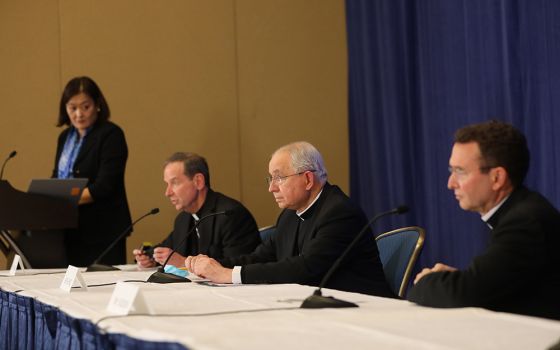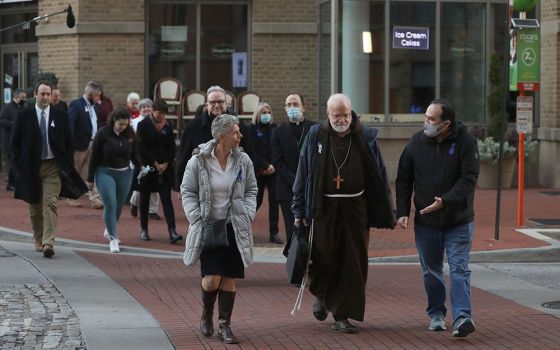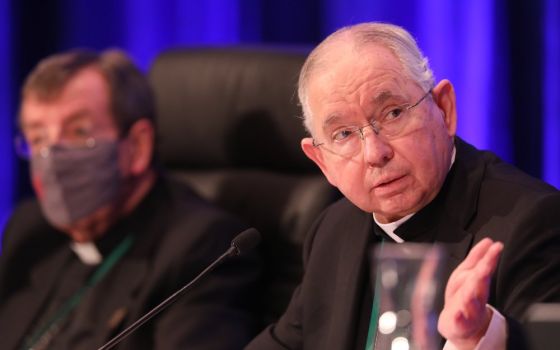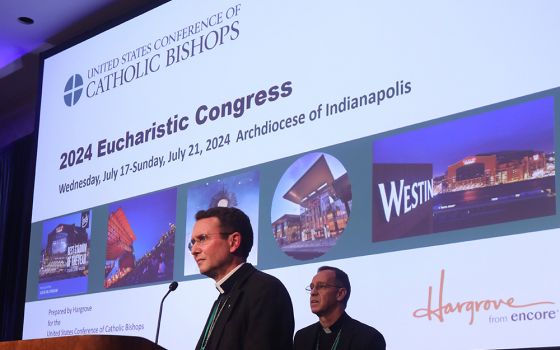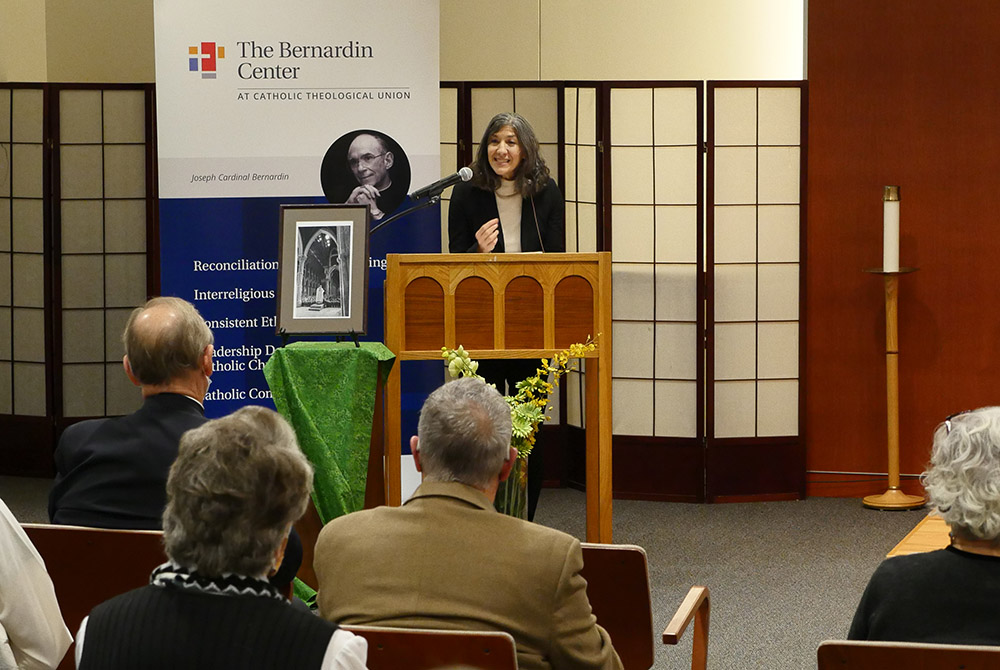
Julie Hanlon Rubio speaks during an event marking the 25th anniversary of the death of Cardinal Joseph Bernardin, Nov. 14 at the Bernardin Center at Catholic Theological Union in Chicago. Rubio and other panelists discussed how the late Chicago cardinal's legacy — of openness to dialogue, reaching across differences and a willingness to engage with the world — could be continued today. (Courtesy of Catholic Theological Union)
Theologian Julie Hanlon Rubio was involved with the Catholic Common Ground Initiative — initially founded in 1996 by the late Cardinal Joseph Bernardin to lessen divisions in the church — when the project was discussing particularly heated topics around sex.
"To be honest, there was a moment when I walked out," she said. "The difficulty of working through differences became too much and I just had to have space to breathe."
But after going for a walk, she came back.
"And knowing that many involved in the Catholic Common Ground Initiative and similar projects kept coming back gave me the inspiration to keep going," she said.
Rubio, the author of Hope for Common Ground: Mediating the Personal and Political in a Divided Church, was one of four speakers on a panel marking the 25th anniversary of Bernardin's death. The Nov. 14 event was sponsored by the Bernardin Center at Catholic Theological Union.
But the event was more than a nostalgic reminiscence of a half-century ago. Instead, the panelists discussed how the late Chicago cardinal's legacy — of openness to dialogue, reaching across differences and a willingness to engage with the world — could be continued today.
Rubio's reflections on finding common ground seemed especially pertinent on the eve of the U.S. bishops' fall general assembly with a contentious document on "eucharistic consistency" on the agenda. Although the document has been tamed, it began as a desire to consider denying Communion to President Joe Biden, who is both Catholic and pro-choice.
"The Catholic Common Ground Initiative has never been easy," Rubio admitted, "but this seems an especially troubling time to think about its future."
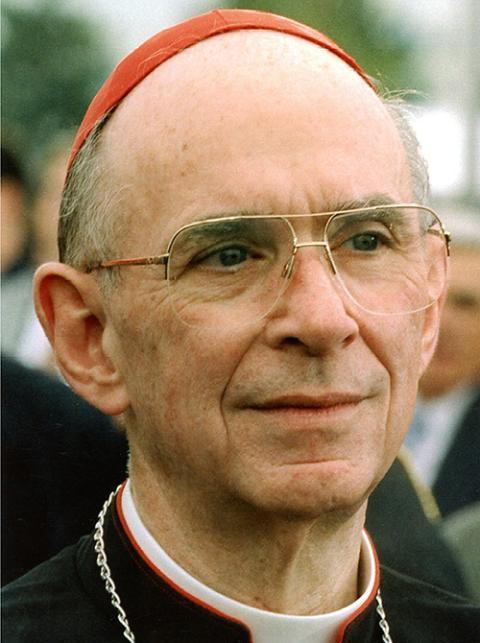
The late Chicago Cardinal Joseph Bernardin is seen in this 1995 photo. (CNS files)
To those who argue that such an enterprise is not worth the energy, Rubio responds that she remains determined. "We can talk despite our differences," she said. "I see no reason to abandon the work of seeking common ground now."
But I was struck by her observation that when Bernardin first announced the initiative, much of the criticism came from conservatives who were "anxious that truth would be papered over with tolerance." Opponents included two fellow cardinals, Bernard Law of Boston and James Hickey of Washington, who criticized the project publicly.
"But today the criticism is more likely to come from the left," said Rubio. "Common ground is associated with meeting in the middle, where justice may not be, with placing civility and politeness over speaking truth to power, with asking people on the margins to expend valuable energy explaining once again why their lives matter to people who just don't get it."
Fellow panelist Michael O'Loughlin, national correspondent at America magazine, acknowledged that asking people whose identity or rights are not respected to engage in dialogue "can be a traumatic experience."
"Creating that space where people won't feel threatened if their personhood is diminished by engaging in dialogue, that has to be a project we think more seriously about," said O'Loughlin, author of a forthcoming book about the church's ministry to people with HIV/AIDS.
He admitted he didn't have the answers about how to do that.
Rubio, whose own marriage models the possibility that she "could love and share a great deal with someone whose vote canceled out mine," also said she recognizes that the work of dialogue requires not just letting go of one's preconceptions and certainties, but also the virtues of truth-telling, just anger and self-care.
"Not everyone is called to the demanding work of common ground," she said, adding that "some black, Latinx, Asian, LGBTQ and feminist Catholics are tired of charged conversations on issues that shape their daily lives."

Protesters opposed to a plan to deny Communion to pro-choice politicians march in Baltimore Nov. 15 before the U.S. bishops' meeting. A counter-protester yelled at Jamie Manson, executive director of Catholics for Choice, third from the right. (Photo courtesy of Women's Ordination Conference)
I was thinking about this as I watched a livestream of a prayerful protest of church reform groups during the U.S. bishops' meeting, in which a "counter-protester" yelled at Jamie Manson, executive director of Catholics for Choice.
The heckler shouted, "Get out of my sight" and accused LGBTQ people of being a "violation of the natural law" and a "sin against nature."
Manson, courageously, remained calm and replied, "As a very proud lesbian, I am here to tell you that God is as alive in my love as God can be alive in any other love."
The next day the apostolic nuncio, the pope's representative in the United States, Archbishop Christophe Pierre gave a pep talk on synodality. "The church that teaches must first be the church that listens," he said to the U.S. bishops at their meeting.
Yet the panelists at the Bernardin event admitted that the church has not always made the case for civility and dialogue.
"We need to look at the church's failures, especially in being a witness for common ground," Rubio said. "I don't think many people would look to the Catholic Church and say, 'They're showing us how to do it well.' "
If the synod on synodality is to have any value, it must provide a safe space where all Catholics can speak of their experiences, without others demanding that they "get out of my sight."
Cardinal Bernardin, pray for us.
Advertisement





